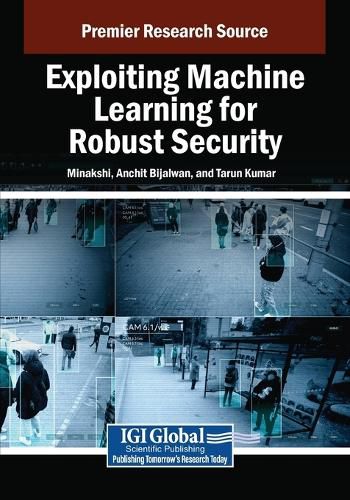Readings Newsletter
Become a Readings Member to make your shopping experience even easier.
Sign in or sign up for free!
You’re not far away from qualifying for FREE standard shipping within Australia
You’ve qualified for FREE standard shipping within Australia
The cart is loading…






This title is printed to order. This book may have been self-published. If so, we cannot guarantee the quality of the content. In the main most books will have gone through the editing process however some may not. We therefore suggest that you be aware of this before ordering this book. If in doubt check either the author or publisher’s details as we are unable to accept any returns unless they are faulty. Please contact us if you have any questions.
In the digital world, ensuring robust security is critical as cyber threats become more sophisticated and pervasive. Machine learning can be used to strengthen cybersecurity and offer dynamic solutions that can identify, predict, and mitigate potential risks with unprecedented accuracy. By analyzing vast amounts of data, detecting patterns, and adapting to evolving threats, machine learning enables security systems to autonomously respond to anomalies and protect sensitive information in real-time. As technology advances, the integration of machine learning into security systems represents a critical step towards creating adaptive protection against the complex challenges of modern cybersecurity. Further research into the potential of machine learning in enhancing security protocols may highlight its ability to prevent cyberattacks, detect vulnerabilities, and ensure resilient defenses. Exploiting Machine Learning for Robust Security explores the world of machine learning, discussing the darknet of threat detection and vulnerability assessment, malware analysis, and predictive security analysis. Using case studies, it explores machine learning for threat detection and bolstered online defenses. This book covers topics such as anomaly detection, threat intelligence, and machine learning, and is a useful resource for engineers, security professionals, computer scientists, academicians, and researchers.
$9.00 standard shipping within Australia
FREE standard shipping within Australia for orders over $100.00
Express & International shipping calculated at checkout
Stock availability can be subject to change without notice. We recommend calling the shop or contacting our online team to check availability of low stock items. Please see our Shopping Online page for more details.
This title is printed to order. This book may have been self-published. If so, we cannot guarantee the quality of the content. In the main most books will have gone through the editing process however some may not. We therefore suggest that you be aware of this before ordering this book. If in doubt check either the author or publisher’s details as we are unable to accept any returns unless they are faulty. Please contact us if you have any questions.
In the digital world, ensuring robust security is critical as cyber threats become more sophisticated and pervasive. Machine learning can be used to strengthen cybersecurity and offer dynamic solutions that can identify, predict, and mitigate potential risks with unprecedented accuracy. By analyzing vast amounts of data, detecting patterns, and adapting to evolving threats, machine learning enables security systems to autonomously respond to anomalies and protect sensitive information in real-time. As technology advances, the integration of machine learning into security systems represents a critical step towards creating adaptive protection against the complex challenges of modern cybersecurity. Further research into the potential of machine learning in enhancing security protocols may highlight its ability to prevent cyberattacks, detect vulnerabilities, and ensure resilient defenses. Exploiting Machine Learning for Robust Security explores the world of machine learning, discussing the darknet of threat detection and vulnerability assessment, malware analysis, and predictive security analysis. Using case studies, it explores machine learning for threat detection and bolstered online defenses. This book covers topics such as anomaly detection, threat intelligence, and machine learning, and is a useful resource for engineers, security professionals, computer scientists, academicians, and researchers.